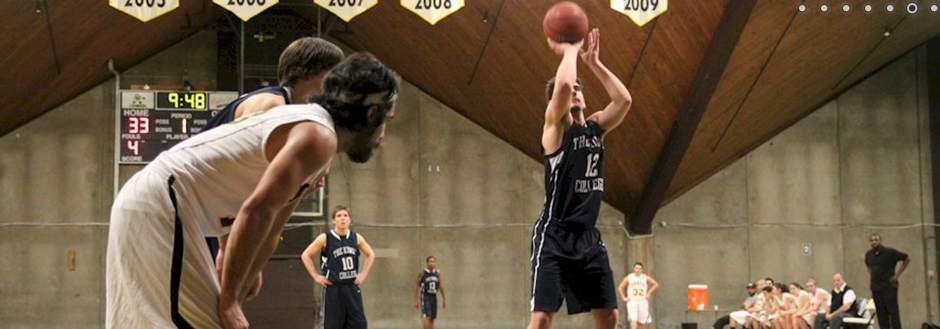Making sport of athletics

The result is our 67 percent retention rate, our House system that favors freshmen and mostly ignores its upperclassmen, and a “Christian community” that is little more than some tenuously connected rugged individualists. So how can we increase “school spirit”? There are, presumably, a number of ways. But I’m going to focus on just one: our current attendance policy and how it kills student participation in anything but academics.
As a student athlete at King’s, I’ve always wondered why my professors and the faculty seem not just disinterested (as Tubbs would say) but uninterested in the final score of our last basketball game. And why even the slightest mention of athletes signing up for classes early or receiving make-up work for classes brings about wails of “favoritism” and much gnashing of teeth.
But at King’s there is “no good excuse” for missing class: everything is marked unexcused.
This no-make-up policy for missed assignments and quizzes is not unique to student athletes. When students arrive at King’s, they hear about a community where students look out for one another, where rules take a backseat to restoration, and where we will all, at long last, be treated like adults. Once you’ve been at King’s for any time, you realize this notion of “student autonomy” and “responsibility” that the administration so lauds is a subject better suited for a Kreeft course than an Inviso luncheon—it’s complete fiction.
I don’t want to state the matter too strongly, or, worse, to come across as a bitter senior (all too common already). I should here put in the requisite statement that I, like everyone else, love the school. And before you say it, yes, I know the school is young. In the short time I’ve been here I’ve seen it change for the better, and I trust it will continue to do so. And that is precisely why I bring this complaint to the paper, because I believe that, with enough student voice, the policy might change.
The school requires that professors take attendance to ensure students are coming to class. A noble enterprise, no doubt. And I have no problem with attendance requirements (in fact I think they’re necessary for accreditation). Neither do I have a problem with class participation grades or that professors can significantly reduce those grades at their sole discretion. Some lesser students might here bemoan the irony in that our republican-politics professors can strike down our grades with an unchecked and almost monarchical unilateralism, but I am not one of those students.
What I do take issue with is the failure of administration to differentiate between excused and unexcused absences. We can require students not miss any more than six classes, but at least let students who miss class for a House event, or because they are student athletes, or because they are representing King’s in some other event (debate, Inviso, &c.) make up assignments and quizzes. It’s one thing to mark absent if the student is in fact absent; it’s a very different thing to penalize a student for an absence he had no control over (or, better yet, an absence in which the student is sacrificing his time to support the school).
In my first semester at King’s I took an “Introduction to Economics” course with Professor Brenberg. “People respond to incentives,” he said. For student athletes, the incentives of the King’s attendance policy are pretty clear: split your time evenly between the classroom and the library.
I’m the captain of the basketball team and President of my House. I receive no scholarship to play sports. But I train two hours a night, three days a week, for the opportunity to wear my number-11 jersey that reads “King’s” on it. I do it because I love the school, I love basketball, and I think by playing I can further King’s mission of influencing the world—getting King’s name out there, one game at a time.
But I’m tired. Tired of the divide between athletics and academics. Tired of the look I get from professors, like I’m crazy for asking to make up a quiz when I was traveling to play in a tournament. Tired of hearing the administration ramble on about how they treat us like adults while they’re clutching us like children.
The Provost’s Office should require professors allow make-up work for athletics and other school-related but extramural functions.
Who cares about student athletes at King’s? Our job here is to be students, right? Everything else is distraction, white noise. There’s nothing to be learned from sports, and certainly no gain to the college to participate in any conferences. Just ask any classical bastion of academic excellence: Harvard, Duke, Princeton—they all forgo Division-I athletics to focus on academics, right? Right? And certainly the ancient Greeks, our intellectual predecessors, didn’t stress achieving the excellence of the physical body, or laud their athletes and warriors, or create any worldwide competitions of physical trial and carnal celebration named after the dwelling place of the very gods they worshiped the traditional quadrennial celebration of which still lasts in the modern world. That would be crazy-talk.
King’s advertises a holistic education, but dismisses health and sports as “non-academic.” King’s wants a strong community, but disregards the importance of athletic camaraderie and focuses only on individual academic performance—even in the face of waning student unity in a college that doubles in size every few years.
Much to the chagrin of our philosophically inclined faculty, King’s is not the ideal city of philosopher-warrior-kings. It’s a bunch of stuffy academics whose only use for their stick-bug-thin bodies is to shuttle their overinflated, borderline-hydrocephalic craniums between Christianity & Existentialism and Old Testament Literature. But there’s real good and real not-in-a-book education for students participating in athletics. And there’s profit, both dollar-wise and mission-wise, for the college.

